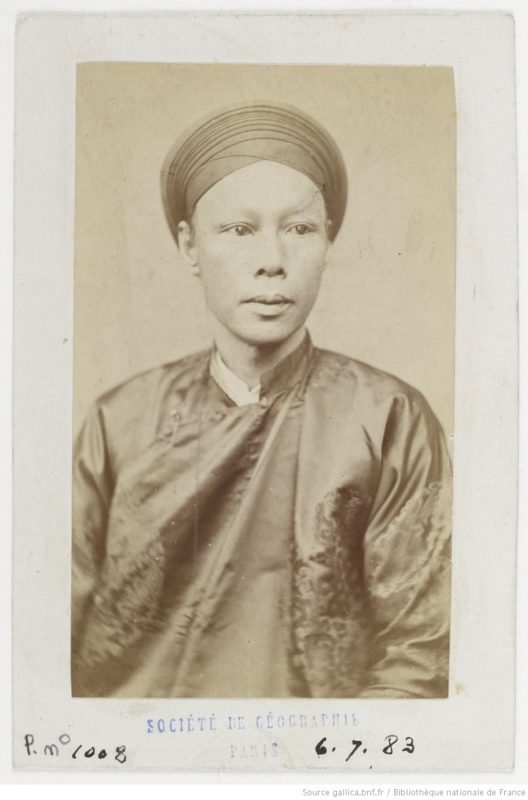But these politicized narratives fail to recognize the efforts of the Nguyễn Dynasty and South Vietnam to revolutionize knowledge and education in Vietnam. Long before the Tonkin Free School opened its doors, the Nguyễn Dynasty had been working towards increasing literacy via the establishment of three levels of schooling in the south that provided education in Quốc Ngữ. In addition, Franco-Annamite schools in South Vietnam, then called “Cochinchina,” had already been teaching Quốc Ngữ since 1861. By 1869, Cochinchina had 126 Franco-Vietnamese primary schools with more than 4,000 students whereas there were only 42 such schools in North Vietnam (then called “Tonkin”) by 1887.
Most notable of the Nguyễn Dynasty’s school system was the introduction of schools at the village level under village governance. The other two levels, elementary and middle, fell under dynastic governance. To further efforts to increase literacy, Emperor Thành Thái ordered, in 1906, the creation of textbooks to teach both Chữ Hán and Quốc Ngữ and offered parents the option of having their children focus on studying one or the other. The dynasty also ensured instruction on all of the subjects in the civil service exams so that this knowledge would be accessible to all. Moreover, according to historian Liam Kelley, despite Communist Vietnam and French claims, only the Nguyễn Dynasty had the power and influence to truly spread the usage of Quốc Ngữ among the masses and to spur the critical literary and cultural revolution that swept through Vietnam in the early twentieth century.
The fact that South Vietnam is often denied it’s distinction as a separate entity as a result of revisionist and skewed historical representations should always be kept in mind when reviewing historical narratives especially if they are found on Vietnam-based tourist travel-logs or wikipedias. South Vietnam is often mythologized as either a puppet or collaborator of Western or colonial forces or a passive, invisible part of Vietnam, its social, political, and cultural distinctions blurred. Far from its reductionist characterization, the Republic of Vietnam has a long history dating back into the 10th Century where it was marked by female leadership under Nguyễn Thị Anh, who served as the official regent of Đại Việt (an earlier name for Vietnam) for her infant son, Emperor Lê Nhân Tông, between 1442 and 1453, a period noted for its peace.
For centuries, the Nguyễn lords controlled the vast southern region of Vietnam and later became the ruling dynasty of all of Vietnam. Their efforts towards nation and state building, counterinsurgency, and socio-political reform should be recognized and studied, even with all of its feudalistic flaws and its ultimate ruin by colonialism and the politics of the Vietnam War era. The continued minimization of South Vietnam discredits not only South Vietnam, but also the political complexity of Vietnamese civilization with its multilayered internal non-European- and non-American-centric conflicts. (Imagine that!) Strife and debate between virulently oppositional ideologies and political visions for the shape and form of Vietnam is a critical part of the intellectual evolution of Vietnamese people and society, both in the country and in the diaspora. Elements of this history contribute to who we are. They should not be cherry-picked to serve propaganda or revisionist history.
For example, historian Christopher Goscha reveals in Vietnam: A New History that there were prominent Vietnamese who advocated for a “colonial republic” similar to that in other countries such as India and the Philippines. Their work to position Vietnam to be able to compete in the modern world contributed to intellectual debates about nation-building and resulted in stepping stones towards modernity in Vietnam.
Modern Vietnam was also born from the vast changes to its communication and transportation systems brought on by newly built telegraph lines, railroads, electricity, and water and sewage systems as a result of colonization. Rapid urbanization occurred with cities experiencing large population growth.
Populous cities and French colonial schools became breeding grounds for an increasingly radicalized Vietnamese anti-colonial intelligentsia. In 1861, to get a handle on anti-colonial activity and to create an avenue for surveillance, the French secret police sponsored the introduction of the first modern printing press and the establishment of the press. Prior to the press, anti-colonial sentiment used Chinese characters foreign to the French. Introduction of the press resulted in a more public and monitorable display of criticism in French or Quốc Ngữ.
But it also created an opportunity for critics of the colonial system to spread their opinions to a wider audience than ever before. Most significantly, it created what was formerly kept private—the public opinion or công luận or dư luận—and built a sense of cohesiveness and a shared national consciousness among Vietnamese people that had not previously existed. Vietnamese literati with anti-colonial sentiments printed incendiary articles and poems which sparked tighter colonial choking in the form of regulations, censorship clearances, controls, and—you guessed it—ransacking publishing offices and clamping down on dissident writers by harassing publishing houses, participants, and patrons, imprisoning writers, and forcing writers into exile. Guess some colonial influences are hard to leave behind (i.e. Cafe Du Monde, bánh mì, and dissent crackdowns).

A more literate populace created interest in newspapers and journals which became a center space for discourse and debate on Vietnam’s social, cultural, and political issues. The first French-sponsored Quốc Ngữ paper, Gia Định Báo, was started in 1865 in Saigon and operated by Trương Vĩnh Ký (also known as Pétrus Ky). Through the paper, Trương promoted learning Quốc Ngữ and provided translations of Chinese classics and transliterated works in Chữ Nôm. Southern scholar Huỳnh Tịnh Của (or Paulus Huỳnh Tịnh Củ) was also instrumental by creating the first Quốc Ngữ dictionary.
The North followed suit 52 years later with the first successful Quốc Ngữ newspaper in Hà Nội, Đông Dương Tạp Chí, founded by Vietnamese journalist and translator of Western literature, Nguyễn Văn Vĩnh in 1913. Recognized as a non-communist nationalist, he advocated for Vietnamese adoption of Western ways and was critical of the Việt Nam Quang Phục Hội (Vietnam Restoration League), a nationalist republican militant revolutionary organization formed in 1912 by Phan Bội Châu and Prince Cường Để. In addition, there were many more periodicals and journals including Phụ Nữ Tân Văn, which was the first influential women’s periodical, established in Saigon and run by women in the 1920s.
One of the most challenging regulations that periodicals faced was the requirement that it have a French citizen as its director. Though there were a small number of Vietnamese with French citizenship, most Vietnamese had to search for a sympathetic Frenchman. Once periodicals were printed, any critical discussions were quickly suppressed by colonial powers with publications having to close shop, only to attempt to reopen with a new name and a new benefactor. In such an environment, turnover of papers was a persistent problem. The colonial censorship engine also reviewed all publications and often forced Vietnamese writers to adjust their essays. This pushed writing underground and resulted in the subversive transmission of information such as the 1931 French abridgment of Karl Marx’s Das Kapital in a book of logarithm tables.
At the turn of the 20th Century, the press became a primary means of advancing nationalism. Scholar, Duy Lap Nguyen, noted:
“[t]he media…which had been originally established in order to “kill the patriotism” of the Confucian elite, would become a means of “saving the nation through a path of culture” (cứu nước bằng đường lối văn hóa), promoting “nationalism through language” (chủ nghĩa quốc gia bằng ngôn ngữ).”
Like most civilizations facing oppression, the Vietnamese retooled the linguistic and cultural systems that had been forced upon them to their own advantage.
Sources:
- Christopher Goscha. (September 13, 2016). Vietnam: A New History, Basic Books; 1st edition.
- Liam Kelley, Le Minh Khai’s SEAsian History Blog (and More!)
- (November 17, 2013). An Alternative Narrative of the Transition to Westernized Modernity in Early-Twentieth-Century Vietnam.
- (November 6, 2016). Rethinking The History Of Early-Twentieth-Century Vietnam.
- (November 6, 2016). The Quốc Tử Giám And The Transformation Of Traditional Learning In 1910s Vietnam.
- (November 6, 2016). The Untold Story Of The Self-Modernization Of Vietnam’s Traditional Elite.
- (November 8, 2016). Emperor Thành Thái’s Educational Revolution.
- Vu Hong Lien. (2013). The Making of Saigon from the Nguyen Lords to 1954, London, UK, British Academy.
- Jonathan D. London. (2011.) Education in Vietnam: Historical Roots, Recent Trends, Singapore: Institute of Southeast Asian Studies Publishing.
- David G. Marr. (1984). Vietnamese Tradition on Trial (1920-1945), University of California Press.
- Duy Lap Nguyen. (2020). The Unimagined Community: Imperialism and Culture in South Vietnam. Manchester: Manchester University Press, Postcolonial Studies.
- Huong Nguyen. (November 17, 1999). The Emergence of Modern Vietnamese Literature – Cong-Huyen-Ton-Nu Nha-Trang – Literary Vietnam.
- George J. Veith. (2021) Drawn Swords in a Distant Land: South Vietnam’s Shattered Dreams, Encounter Books, New York.
- Brett Reilly. (2016). “The Sovereign States of Vietnam,” Journal of Vietnamese Studies, Vol. 11, Issue 3-4, pps. 103–139.
- Li Tana. (Mar., 1998). “An Alternative Vietnam? The Nguyen Kingdom in the Seventeenth and Eighteenth Centuries,” Journal of Southeast Asian Studies, Vol. 29, No. 1 , pp. 111-121.
- John Phan. (February 2013). “Chữ Nôm and the Taming of the South: A Bilingual Defense for Vernacular Writing in the Chỉ Nam Ngọc Âm Giải Nghῖa,” Journal of Vietnamese Studies, Vol. 8, Issue 1, pps. 1-3.
- Tran Xuan Hiep, Tran Dinh Hung, Nguyen Tuan Binh, Nguyen Anh Chuong & Tran Thai Bao. (2021). Another view of the “Closed-door policy” of the Nguyen Dynasty (Vietnam) with Western countries (1802 – 1858), Cogent Arts & Humanities, 8:1.
- Brian A. Zottoli. (2011). Reconceptualizing Southern Vietnamese History from the 15th to 18th Centuries: Competition along the Coasts from Guangdong to Cambodia. University of Michigan.
Contributor’s Bio
 Z.M. Quỳnh is currently working on a novel that highlights the experiences of ARVN soldiers. You can visit her at zmquynh.com.
Z.M. Quỳnh is currently working on a novel that highlights the experiences of ARVN soldiers. You can visit her at zmquynh.com.


